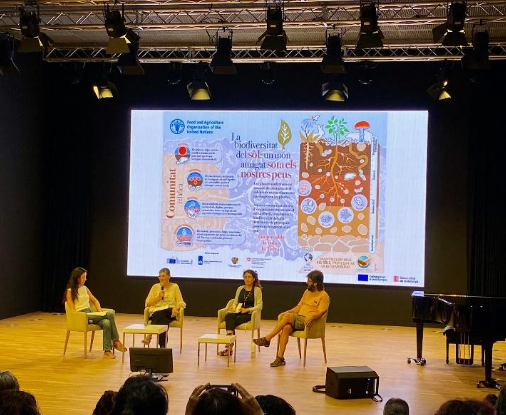LOESS PROJECT PARTNERS COLLABORATE WITH THE GOVERNMENT OF CATALONIA TO TRAIN SECONDARY SCHOOL TEACHERS IN SOIL HEALTH
On July 7 and 8, 2025, the Training Day for Teachers to Address Planetary Health Challenges through Citizen Science and Service Learning was held at the Planetary Health Development Center – Mollet del Vallès Health Foundation.
This initiative, promoted within the framework of Catalonia’s current Smart Specialization Strategy (RIS3CAT 2030), aims to encourage young people’s involvement in the social and environmental challenges of their territory, with the goal of empowering them as agents of change and transformation.
The event featured lectures and roundtable discussions with experts in planetary health and citizen science, hands-on workshops to explore innovative methodologies and practical tools for the classroom and community service, and collaborative work to test, adapt, and validate educational proposals.
On Monday, July 7, conceptual frameworks and inspiring experiences were presented to help integrate planetary health into educational contexts. Rosa Maria Poch, Professor of Soil Science at the University of Lleida (UdL), and Oriol Guinart, education specialist at the Specific Pedagogical Resource Center for Innovation and Educational Research (CESIRE) and member of EduGlobalSTEAM—both part of the LOESS Project’s Community of Practice (CoP) in Catalonia—participated in a roundtable discussion moderated by Carla Oliva, member of the Opportunity Discovery Mechanism (MDO) of the Department of Research and Universities of the Government of Catalonia. The session also included Cristina O’Callahan, researcher at the Barcelona Institute for Global Health (ISGlobal).


On Tuesday, July 8, educational proposals were presented to address planetary health challenges through citizen science, community service, and learning scenarios. Four thematic blocks were explored: noise pollution, air quality in school environments, soil state and health, and textile waste prevention. Alongside Rosa Poch (UdL), the workshop on soil state and health was led by Àngela Ribas and Juani Hallat, researchers at the Centre for Ecological Research and Forestry Applications (CREAF); Paula Santolalla, Head of Communications at the Catalan Association of Public Universities (ACUP), a LOESS project partner; and Xavier Renom, co-founder and CEO of Justinmind, also a project partner.




The workshop began with a brief introduction to soil in the context of planetary health, a review of the European sociopolitical and legal framework, and a summary of basic soil concepts (composition, diversity, functions, etc.). Next, the proposed structure for a service-learning project to assess soil quality was presented: organization of the guide and description of the main physicochemical (compaction, salinization…) and biological (loss of soil biodiversity) impacts contributing to degradation. Various components that can serve as indicators to measure the degree of impact were described, and participants engaged in practical, experiential activities to characterize threatened soil properties. Finally, the LOESS project and its educational resources were showcased, with special emphasis on the crowdmapping tool. Thanks to this tool, students from different schools will be able to input information about soil-related challenges in their surroundings. This will allow them to collect and analyze data on soil condition at local and regional scales and propose mitigation measures for priority areas.

Teachers who completed the training program received official certification from the Department of Education and Vocational Training of the Government of Catalonia.
Throughout the 2025–2026 academic year, participating teachers will be able to implement service-learning projects as part of the community service curriculum for 3rd and 4th year secondary students, with support from experts (one in-person technical support session and several online follow-up sessions), a teaching guide, and the necessary materials. Teachers who implement the project with a minimum group of 10 students will receive an innovation credit from the same Department.
This collaboration between the Catalan partners of the LOESS project—ACUP and Justinmind—and the Government of Catalonia stems from a policy workshop held on May 6 at the Barcelona Hub Social with members of the Opportunity Discovery Mechanism (MDO) from various departments of the Government of Catalonia —Department of Education and Vocational Training, Department of Research and Universities, Department of Agriculture, Livestock, Fisheries and Food, and Department of Economy and Finance— where the project and its educational resources were presented. Following the policy workshop, representatives of the Generalitat were invited to attend, as observers, the Is soil more than just dirt? workshop held on 11 June at the laboratories of the Autonomous University of Barcelona (UAB), based on four learning scenarios developed by LOESS project partners.



